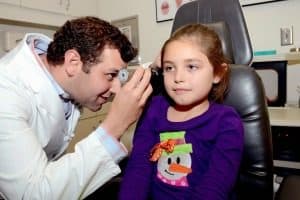Ear infections are the most common reason parents take their children to the doctor. If your child is suffering from ear pain, it could be an ear infection—and Pediatric ENT Associates at Children’s of Alabama (PENTA) can help. PENTA, located in Birmingham, Alabama, has five board-certified doctors specializing in diagnosing and treating pediatric ear, nose, and throat conditions.
Dr. Kulbersh was recently featured on Romper, a new motherhood blog, advising readers on how to combat ear infections in young children. Take a look at some of PENTA’s must-know information on preventing ear infections.
Kids and Ear Infections: An Unfortunate Match

While some kids are more prone to ear infections than others, kids under the age of 4 are at particularly high risk, especially during the fall and winter months when respiratory infections are common.
Due to immune systems that are not yet fully developed, it can be more challenging for children to fight off infections. Family history can also play a role in how susceptible your child is to developing ear infections.
There is a tube that connects the back of the nose and the ear called the eustachian tube. The eustachian tube is flat in young children, and when kids have a cold or the flu, it can swell and trap fluid in the ear with no place to drain. If your child is susceptible to ear infections, it tends to get better as they age and their anatomy changes, making it easier for fluid to drain.
5 Ways to Prevent Ear Infections
Some home prevention ideas that can help reduce ear infections include:
1. Keep Vaccinations Current
Studies show that children with up-to-date vaccinations are less likely to develop ear infections. One reason may be that the pneumococcal vaccine protects against streptococcus pneumonia, a common cause of ear infections. The flu vaccine is also shown to reduce the likelihood of ear infections. Keep vaccinations current to help protect your child, especially if they are prone to ear infections.
2. Don’t Offer Bottles in Bed
When infants or young children lie down flat, avoid giving them liquids. The reflux of liquids into the eustachian tubes can spur bacterial growth and contribute to ear infections.
3. Avoid Secondhand Smoke
Smoking or exposing your child to secondhand smoke is never a safe idea. If your child is experiencing a lot of ear infections, it could be due to smoke exposure. Smoke is associated with increased ear infections due to the inflammation of the eustachian tubes and reduces the effectiveness of the ear’s clearing mechanism.
4. Stop Germ Spread
Germs are a significant culprit of ear infections that can be wiped out with thorough and constant hand washing. Kids that adequately wash their hands with soap and water are more likely to remove germs that cause colds and ear infections. Hand washing should always occur after using the restroom, before mealtimes, after coughing or sneezing, and after coming in contact with others.
5. Decrease Pacifier Use
The sucking motion associated with pacifier use can inhibit proper function of the eustachian tube. When it is not correctly functioning, children are more likely to develop ear infections. It is recommended to wean pacifier use during 6-12 months of age.
Symptoms of Ear Infections in Children

Ear pain is the most common indicator of an ear infection, but there are other important signs to keep an eye on. Chances are, even if your child cannot verbally communicate symptoms to you, you can notice these telltale signs:
- Ear Pain
- Fever
- Tugging or pulling on the ear(s)
- Loss of appetite
- Increased fussiness or irritability
- Vomiting or diarrhea
- Difficulty getting settled or sleeping
The younger a child is when they have their first ear infection, the more likely they are to continue developing repeat infections.
When to Seek Treatment
In some cases, an ear infection clears without any intervention. Sometimes an ear infection requires a visit to your pediatrician, especially if:
- Symptoms worsen
- Symptoms last more than 3 days
- Fever is higher than 102
- Pus or fluid is coming from the ear
- Hearing is impacted
If your child is experiencing these symptoms, schedule a visit to your pediatrician or a otolaryngologists to discuss diagnosis and treatment options.
When Infections become Chronic
A pediatrician can diagnose and treat ear infections, but it may be time to see a pediatric ENT when a child experiences more than four ear infections in a year. Your child may need to see a specialist for chronic ear infections due to:
- Speech delays
- Fluid in the ears for more than three months
- Rupturing eardrum during an infection
- Medication allergies or unable to take oral medications
- Severe diarrhea, vomiting, or nausea with infections
- Multiple antibiotics needed for one infection
Contact a Pediatric Otolaryngologist in Birmingham
Pediatric ENT Associates at Children’s of Alabama can diagnose and treat chronic ear pain to help your child feel better. Our skilled and experienced pediatric otolaryngologists work with you and your child to identify causes and the best treatment plans to reduce ear infections and eliminate severe symptoms.
Contact us to schedule an appointment and learn more about how we can help your child.


